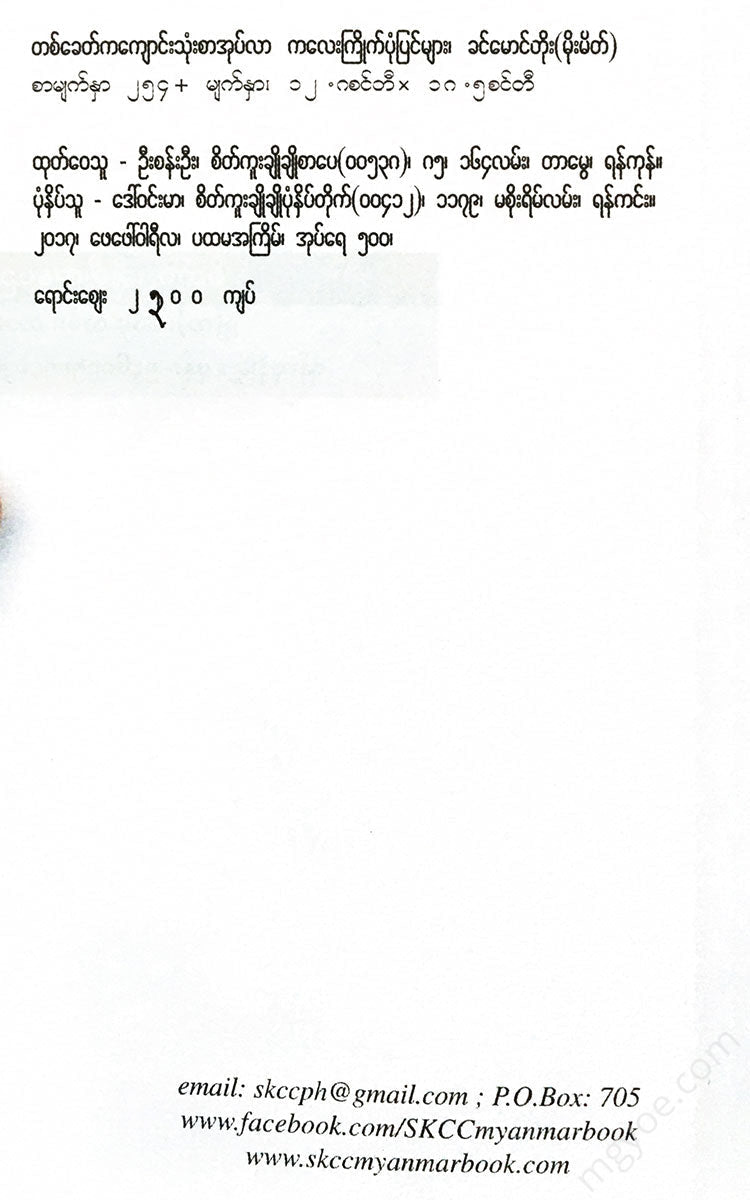စိတ်ကူးချိုချိုစာပေ
Khin Maung Toe (Moe Meik) - Stories from a school textbook from a bygone era
Khin Maung Toe (Moe Meik) - Stories from a school textbook from a bygone era
Couldn't load pickup availability
Translator's note
It has been a long time since I translated the stories in this book. I don’t remember the exact year, but they were stories that were used in Shwe Yo and Pi Tauk Myay when the “Shwe Yo” magazine and “Pitauk Myay” magazine were first published. Later, when I turned to the honchin, I seemed to forget these stories. (When I translated these stories, I had very few opportunities to write honchin. So I translated these stories after rereading the English story books I bought and the English textbooks for children that were published many years ago. The stories in the school books are often short. But I don’t really care about short or long ones. I translate them when I feel like it. Well... it’s the same with honchin stories. The stories in honchin are often long.
Anyway, I'm really happy that the stories I've been reading, that I've enjoyed, that I've enjoyed, have come together as a single whole.
This manuscript reached Ko San Oo (Kyawthon Cho Cho) because Ko San Oo had said, “I want to publish stories too.” Now, Ko San Oo has published many of my translated stories, both short and long. I am grateful to Ko San Oo (Kyawthon Cho Cho) for accepting and publishing every time I submit a manuscript.
I will send my eternal love to all the publishers and readers. I respect you.
With respect and love...
Khin Maung Toe (Moe Meik)
3-12-2015
Contract
There was once a king in England named John. John was not a good man. He was not a good king. He was very cruel. He never behaved properly. He was not good to his father. He was not good to his brothers. He was not good to his friends.
John only cares about pleasing himself. He prioritizes it. He has done countless cruel things to get what he wants. He doesn't hesitate to break the law. He never keeps his promises.
At the very least, they extort money from the people of the country. They rob people. They imprison people.
He just kills anyone who doesn't do what he wants. He even robs churches.
So almost every citizen hated him. The nobles, unable to bear it any longer, finally made a unanimous decision. The decision was to put an end to the cruel John's evil deeds.
Once the decision was made, the nobles heard from the clerk that if he continued to rule unjustly and unjustly, and if he did not give the people freedom, they would no longer accept him as king.
At first, John did not listen carefully when the contents of the letter were read to him. He did not listen, and even said that the king had the right to do as he pleased. But the ministers seemed to do as they were told, so John agreed to meet with them and hear their wishes.
So one day, King John and the nobles met on a green meadow by the River Thames. That meadow is still called the "Meeting Meadow."
On the day of the discussion, the nobles brought a document with information that the king would sign.
The information included not to seize the people's property by force, and not to imprison the people without fair and proper trial. Not only that, but it also listed the atrocities committed by King John. They had already decided to force the king to promise that he would never do such things again.
The high officials read out what was written in the document and asked the king to sign it. By signing, he must have said that he was committed to it.
John was furious when he realized he had no more authority to do what he wanted, and he was about to sign the will of the Lords. But when he looked at the faces of his Lords, they were all very stern. So he knew that if he didn't promise, they would remove him from the throne.
So John, who was very ambitious to be king, had the king's seal stamped on the paper. Now... the great treaty was made by the nobles. This paper, which had the king's seal stamped on it, was called the "Treaty."
John had the royal seal on the treaty, but during his short reign he continued to do as he pleased. The treaty was not kept. But the “treaty” was very useful. Because of this “treaty”, the law was established that the kings and queens of England had no arbitrary power. The powers of the kings and queens were established by law. This law was obeyed by both the people and the kings and queens forever.











